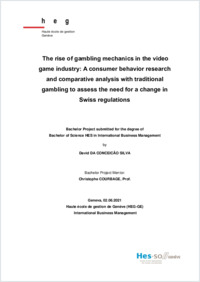The rise of gambling mechanics in the video game industry : a consumer behavior research and comparative analysis with traditional gambling to assess the need for a change in Swiss regulations
SONAR|HES-SO
- Da Conceição Silva, David
- Courbage, Christophe (Degree supervisor)
- Genève : Haute école de gestion de Genève
59 p.
Bachelor of Science HES in International Business Management: Haute école de gestion de Genève, 2021
English
With the video game industry steadily growing into one of the most attractive markets available, companies try to optimise as much as they can the revenue generated and innovate to find new revenue models that stand out and increase their sales. It is in this environment that loot boxes started appearing and gaining momentum. Loot boxes, also defined as loot crates, are packs of virtual items that players can purchase, whose content is random, and the result is unknown before opening. The nature of the content varies in rarity and usually represents in-game items or customisation options. At their core, loot boxes are very similar to gambling as they both require an initial money investment, their result depends on luck, and the outcome has varying levels of value based on the rarity. This led to legislators around the world assessing whether or not they should be considered as gambling. The objective of this paper is to define if these similarities are cause for concern, cover whether or not Swiss law should apply and provide recommendations on what Switzerland should do in terms of regulations and population protection. What current research shows is that there is a significant relationship between loot boxes and problem gambling which can lead to negative physical and mental consequences, regardless of their features. The Swiss gambling law as it is today does not apply to most loot boxes but depending on some factors, a few should be considered and regulated as such. Finally, the primary data used in this research provides insights on the population’s habits and opinion. All in all, the author recommends applying existing gambling law on loot boxes with a cash-out feature as they fit the current definition of gambling in the Federal Act on Gambling. Another recommendation is to prohibit the access of this content in a paid form to minors and at-risk population such as people with a current gambling ban. Finally, the author recommends adding mandatory functionalities such as warnings of the dangers of problem gambling before purchase, transparency in the odds of the items available and a digital counter of the total money spent by a consumer on these items. The combination of these actions should help ensure that loot boxes remain a recreational activity rather than an addiction, protect the most vulnerable part of the population from the predatory methods used to motivate purchase based on cognitive biases, and help consumers make a more informed decision.
- Language
-
- English
- Classification
- Economics
- Notes
-
- Haute école de gestion Genève
- International Business Management
- hesso:hegge
- Persistent URL
- https://folia.unifr.ch/global/documents/319715
Statistics
Document views: 58
File downloads:
- Bachelor Thesis David Silva - The rise of gambling mechanics in the video game industry.pdf: 248
